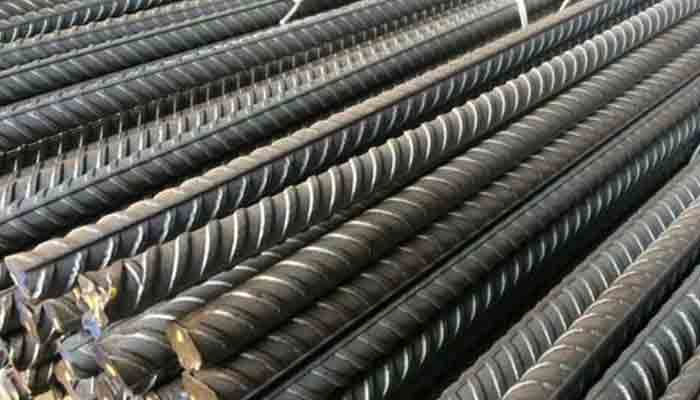Steel industry laments rising energy costs
Industry leaders warn sector will shut down, triggering widespread unemployment
ISLAMABAD: Pakistan’s steel industry is teetering on the edge due to the discriminatory policies and an unbearable surge in the electricity cost.
Industry leaders warn that unless immediate corrective measures were taken, the sector will shut down, triggering widespread unemployment, devastating downstream industries, and eroding the investor confidence in Pakistan’s economic stability.
“The steel manufacturers are being forced to operate in an environment where injustice is at its peak. This is not a crisis just for the steel sector but for the entire economy,” said Wajid Bukhari, Secretary General Pakistan Association of Large Steel Producers (PALSP), in a statement.
“How can the government justify the electricity cost of over PKR65 per kilowatt-hour (kWh) for grid-connected steel mills, while the select sugar mills are wheeling electricity to their plants for as little as PKR18/kWh, without paying sales tax? This glaring disparity is killing the industry.”
The steel sector, which employs millions and fuels over 45 downstream industries, has been brought to its knees by the energy tariffs that have skyrocketed by 267% in just four years. The energy costs for producing one ton steel have ballooned from PKR14,500 in FY2021 to over PKR42,000 in FY2024, pushing many mills to shut down or operate at less than 40% capacity.
Thousands of workers have already been laid off, with more job losses imminent if the situation persists.
Adding to the crisis is the government’s failure to implement the Competitive Trading Bilateral Contract Market (CTBCM) and affordable wheeling charges, despite promises spanning nearly a decade.
Captive industries such as sugar mills continue to benefit from cheaper electricity wheeling facilities, while genuine steel manufacturers on the national grid are left to shoulder the exorbitant costs with no option to wheel.
“The government has miserably failed to provide a level playing field for all industries,” Bukhari emphasized. “CTBCM and affordable wheeling charges have been in the pipeline for years, yet nothing has materialized. The energy policies in this country are neither affordable, nor reliable, nor sustainable. This favoritism and mismanagement is not just bad economics but economic sabotage as well.”
The repercussions of this crisis are far-reaching. Pakistan’s Public Sector Development Program (PSDP) spending, a key driver of demand for steel, has plummeted, bringing public construction projects to a near standstill.
With the public projects accounting for 60% of local steel demand, the sector has seen demand collapse, leading to a severe liquidity crunch and halted investments.
A notable casualty is a major Chinese investor that recently threatened to withdraw operations from Pakistan, citing unaffordable energy costs, excessive taxation, prohibitive borrowing rates and above all large scale production and sale of substandard steel in the country.
-
 Chyler Leigh Pays Moving Homage To 'Grey’s Anatomy' Co-star Eric Dane: 'He Was Amazing'
Chyler Leigh Pays Moving Homage To 'Grey’s Anatomy' Co-star Eric Dane: 'He Was Amazing' -
 Did You Know Tech CEOs Limit Screen Time For Their Own Kids?
Did You Know Tech CEOs Limit Screen Time For Their Own Kids? -
 Matthew Lillard Admits Fashion Trends Are Not His 'forte'
Matthew Lillard Admits Fashion Trends Are Not His 'forte' -
 SpaceX Launches Another Batch Of Satellites From Cape Canaveral During Late-night Mission On Saturday
SpaceX Launches Another Batch Of Satellites From Cape Canaveral During Late-night Mission On Saturday -
 Princess Beatrice, Eugenie Get Pulled Into Parents’ Epstein Row: ‘At Least Stop Clinging!’
Princess Beatrice, Eugenie Get Pulled Into Parents’ Epstein Row: ‘At Least Stop Clinging!’ -
 Inside Kim Kardashian's Brain Aneurysm Diagnosis
Inside Kim Kardashian's Brain Aneurysm Diagnosis -
 Farmers Turn Down Millions As AI Data Centres Target Rural Land
Farmers Turn Down Millions As AI Data Centres Target Rural Land -
 Trump Announces A Rise In Global Tariffs To 15% In Response To Court Ruling, As Trade Tensions Intensify
Trump Announces A Rise In Global Tariffs To 15% In Response To Court Ruling, As Trade Tensions Intensify -
 Chappell Roan Explains Fame's Effect On Mental Health: 'I Might Quit'
Chappell Roan Explains Fame's Effect On Mental Health: 'I Might Quit' -
 AI Processes Medical Data Faster Than Human Teams, Research Finds
AI Processes Medical Data Faster Than Human Teams, Research Finds -
 Sarah Ferguson’s Friend Exposes How She’s Been Since Andrew Mountbatten-Windsor’s Release
Sarah Ferguson’s Friend Exposes How She’s Been Since Andrew Mountbatten-Windsor’s Release -
 Jelly Roll Explains Living With 'severe Depression'
Jelly Roll Explains Living With 'severe Depression' -
 Charli XCX Applauds Dave Grohl’s 'abstract' Spin On Viral ‘Apple’ Dance
Charli XCX Applauds Dave Grohl’s 'abstract' Spin On Viral ‘Apple’ Dance -
 Anna Sawai Opens Up On Portraying Yoko Ono In Beatles Film Series
Anna Sawai Opens Up On Portraying Yoko Ono In Beatles Film Series -
 Eric Dane's Wife Rebecca Gayheart Shares Family Memories Of Late Actor After ALS Death
Eric Dane's Wife Rebecca Gayheart Shares Family Memories Of Late Actor After ALS Death -
 Palace Wants To ‘draw A Line’ Under Andrew Issue: ‘Tried And Convicted’
Palace Wants To ‘draw A Line’ Under Andrew Issue: ‘Tried And Convicted’




